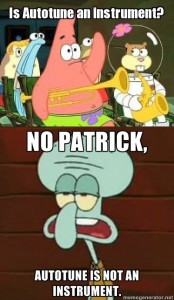Auto-tune, I may not know much about it, except that it sticks out like a watermelon in a cabbage patch because of it’s obvious electronic modifications of the vocals or instruments in a song. This new technology has taken off and can be found in many songs today. I have nothing against auto-tune but, like anything, too much of a good thing can be bad–an sound really fake. (cough cough Nicki Manaj)
After doing some research I found, not-surprisingly, auto-tune was created solely for the purpose of clearing out any off-tune vocals, hence the name. Then the music industry slowly figured out they could also use it to mess with, change up, and experiment with the sounds in the music (which is actually really cool) I think auto tune usually doesn’t sounds good, in some cases it can, but most cases it can’t and doesn’t. Also it takes away any talent from the people who can actually sing. If anyone can use auto-tune to sound like an angel those who can sing well won’t get recognized.
So, I’m going to go over when I can and can’t tolerate auto-tuned music. Generally I believe if the only contribution auto-tune makes is a fake sound, no. But, if it’s maybe more subtle and enhances a certain feel the song is going for, then I can. Such as in the song “These Streets Will Never Look the Same” by Chromatics: there use of auto-tune is successful in that it isn’t over done and imprints a lasting almost haunting feel: http://www.youtube.com/watch?v=6hYPk5m6uuM
I know there are more examples, but an example of a song that has been beat dead by auto-tune (in my opinion) is a song most of us know “Tik Tok” by Ke$ha: http://www.youtube.com/watch?v=iP6XpLQM2Cs I guess if she (or the record company) couldn’t achieve the sound they were going for without auto-tune, I guess I can slightly understand. Who would ever want their voice to sound like Ke$ha’s I don’t know. She just doesn’t need to be that obviously auto tuned.
I guess, also one thing that bothers me is that these songs are the ones played on the radio often and I just don’t see the appeal to it. Shouldn’t the songs with actual talent in them be play more often? Instead we are fed rigged sounds enhanced by computers.
Cite:
http://top40.about.com/od/top10lists/tp/top10autotune.htm
http://www.howstuffworks.com/auto-tune.htm


